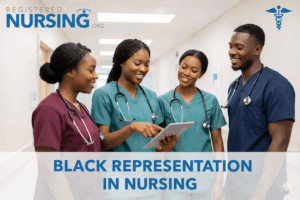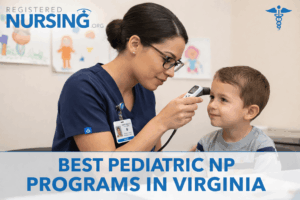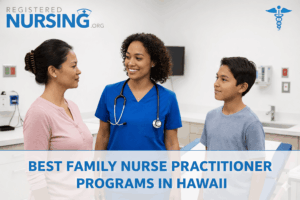Best Nursing Schools in Washington, DC
Washington, D.C., our nation’s capital, is a vibrant hub of culture, history, and opportunity. It also boasts a growing demand for healthcare professionals, including nurses, driven by the city’s diverse population and numerous healthcare facilities. According to recent projections, nursing job openings in D.C. are expected to rise to over 5% higher in the next decade, reflecting the increasing need for skilled caregivers. To explore how you can prepare for and access these opportunities, review the sections below.
2026 Best Nursing Schools in Washington, DC
Top Performing Schools Analysis
The top performing schools demonstrate exceptional student preparation and academic excellence. These institutions consistently achieve high NCLEX pass rates, indicating strong educational quality.- School with highest average pass rate: Georgetown University School of Nursing
- Second highest performing school: Howard University College of Nursing
- Third highest performing school: Catholic University of America
BSN vs ADN Pass Rate Comparison
The comparison between Bachelor of Science in Nursing (BSN) and Associate Degree in Nursing (ADN) programs reveals significant differences in student outcomes. BSN programs generally demonstrate more consistent and higher pass rates compared to ADN programs.- BSN Average Pass Rate: 92.5%
- ADN Average Pass Rate: 85.3%
- Total BSN Students: 387
- Total ADN Students: 215
Pass Rate by Program Size
Program size significantly influences student success rates, with medium and large programs showing more consistent performance.- Small Programs (<50 students): 82.6% pass rate
- Medium Programs (50-100 students): 88.4% pass rate
- Large Programs (>100 students): 91.2% pass rate
George Washington University
Washington, DC - Private 4-year - gwu.edu
Bachelor's - Bachelor of Science in Nursing
Campus Based - Visit Website
George Washington University's Bachelor of Science in Nursing (BSN) offers a comprehensive and adaptable program targeting diverse student populations. With a commendable NCLEX pass rate climbing from 81.89% in 2022 to an impressive 96.05% in 2024, the program demonstrates consistent student success. The curriculum features multiple entry pathways, including a 17-month Accelerated BSN for career changers, a Veterans BSN program, and an Online RN-BSN track for practicing nurses. Located in the heart of Washington, DC, the program emphasizes nursing leadership, clinical excellence, and preparing graduates for immediate professional impact. While specific entrance exam requirements aren't detailed, the program maintains high academic standards and provides flexible educational options for aspiring nursing professionals.
- 17-month Accelerated BSN option.
- Veterans BSN for military credit.
- Online RN-BSN for current RNs.
- Located in Washington, DC.
- Prepares for nursing leadership.
- Diverse admissions pathways.
- Rigorous curriculum.
- Focus on high care standards.
- Immediate clinical readiness.
- Caters to career changers.
Saint Michael College of Allied Health
Washington, DC - Private 2-year - smcah.edu
Associate - Associate in Applied Science Degree in Nursing
Campus Based - Visit Website
Saint Michael College of Allied Health provides a robust Associate in Applied Science Degree in Nursing, strategically designed to launch successful nursing careers. The comprehensive 24-month program spans 70 total credits, with 43 dedicated to nursing-specific coursework. Students benefit from an intensive curriculum covering biophysical and psychosocial sciences, complemented by extensive clinical experiences across diverse healthcare environments. The program consistently demonstrates strong NCLEX performance, with recent years showing impressive pass rates ranging from 80% to 100%. Prospective students must meet a 2.5 GPA requirement and complete prerequisite science courses. Day and evening program options accommodate varied student schedules, making nursing education accessible and flexible.
- 24-month day program option
- 70 total credit program
- 43 nursing-specific credits
- NCLEX-RN exam preparation
- Acute and chronic care focus
- Multiple campus locations
- Prerequisites include science courses
- GPA requirement 2.5
- Science courses must be recent
- Evening program available
Howard University
Washington, DC - Private 4-year - howard.edu
Bachelor's - Bachelor of Science in Nursing
Campus Based - Visit Website
Howard University's Bachelor of Science in Nursing (BSN) offers a comprehensive pathway for aspiring nurses, featuring three distinct study tracks catering to high school graduates, LPNs, and RNs. Students benefit from a robust curriculum blending liberal arts foundations with specialized nursing courses and clinical training. The program rigorously prepares students for diverse healthcare environments, emphasizing culturally competent care and evidence-based practice. Admission requires a competitive 3.0 GPA and successful completion of the TEAS-VI exam. With an NCLEX pass rate typically above national averages, graduates are well-positioned for successful nursing careers, equipped with strong leadership and critical thinking skills essential in modern healthcare settings.
- Campus-based program.
- Three study tracks available.
- Requires 3.0 GPA for admission.
- TEAS-VI exam required.
- Focus on holistic, culturally competent care.
- Strong liberal arts foundation.
- Clinical training included.
- Prepares for diverse healthcare settings.
- Leadership and management skills.
- Evidence-based practice focus.
Bachelor's - LPN to BSN
Campus Based - Visit Website
Howard University's LPN to BSN program provides licensed practical nurses an accelerated route to advanced nursing credentials. This targeted program demands a valid LPN license, prerequisite course completion, and a 3.0 GPA for admission. Candidates must pass the TEAS-VI exam and complete a Casper Assessment, demonstrating commitment to professional development. The curriculum emphasizes critical thinking, ethical practice, and culturally sensitive care, preparing nurses for leadership roles across varied healthcare environments. With a focus on interprofessional collaboration and evidence-based practice, graduates gain comprehensive skills to excel in complex medical settings and pursue advanced nursing opportunities.
- Valid LPN license required
- 3.0 GPA minimum
- TEAS-VI exam completion
- Personal statement needed
- Casper Assessment mandatory
- Campus-based program
- Focus on critical thinking
- Ethical practice emphasized
- Culturally competent care
- Leadership roles preparation
Georgetown University
Washington, DC - Private 4-year - georgetown.edu
Bachelor's - Bachelor of Science in Nursing
Campus Based - Visit Website
Georgetown University's BSN program provides a robust nursing education anchored in Jesuit principles, delivering comprehensive training through extensive clinical immersion. Students complete over 800 experiential hours across diverse healthcare environments, developing critical clinical skills. The curriculum emphasizes patient safety, inclusive care, and professional development. Prospective students should note the program's impressive NCLEX-RN pass rates, which consistently demonstrate high graduate preparedness. The innovative simulation center and opportunities for international study distinguish this program. While entrance exam requirements aren't explicitly specified, applicants can expect a competitive admissions process. Financial support through scholarships and aid makes this prestigious nursing pathway more accessible for aspiring healthcare professionals.
- Traditional four-year program.
- 800+ clinical hours.
- High NCLEX-RN pass rates.
- State-of-the-art simulation center.
- Study abroad opportunities.
- Senior nursing practicum.
- Focus on diversity and inclusion.
- Jesuit values foundation.
- Financial aid available.
- Scholarship opportunities.
The Catholic University of America
Washington, DC - Private 4-year - catholic.edu
Bachelor's - Bachelor of Science in Nursing
Campus Based - Visit Website
The Catholic University of America's Bachelor of Science in Nursing offers an exceptional pathway into professional healthcare, distinguished by its remarkable 94% NCLEX first-time pass rate. Students engage in a comprehensive program emphasizing holistic patient care and moral integrity, complemented by robust clinical experiences and unique opportunities like the Spanish for Health Care Certificate. The campus-based curriculum integrates rigorous academic training with hands-on learning, preparing graduates to excel in diverse healthcare settings. Prospective students should note the program's strong commitment to developing critical thinking skills and communication abilities. Study abroad options further enhance the educational experience, providing a well-rounded approach to nursing education that extends beyond traditional classroom learning.
- 94% NCLEX pass rate
- Campus-based program
- Holistic nursing approach
- Clinical rotation opportunities
- Spanish for Health Care Certificate
- Study abroad options
- Focus on moral integrity
- Hands-on clinical experiences
- Rigorous academic coursework
- Prepares for nursing career
Washington DC Nursing RN Programs – Diploma, ADN, and BSN Degrees
Nursing careers offer multiple entry points for those starting out. If you’re new to the field, you can pursue an Associate's Degree in Nursing (ADN), a nursing diploma, or a Bachelor of Science in Nursing (BSN). Each pathway has its own benefits, so it's essential to understand the differences to choose the one that best aligns with your goals.
Comparing RN Diploma vs. LPN-to-RN vs. ADN Programs
The primary difference between an ADN and an RN diploma is that an ADN is a degree program, while an RN diploma is a training program. ADN programs are usually offered at universities, whereas nursing diplomas are often available through hospitals and other medical facilities. While nursing diplomas may have a slightly shorter timeline, both pathways generally take about two years to complete. If you're already working as an LPN, you might qualify for an LPN to RN bridge program, which can lead to either an ADN or a BSN, depending on the program.
Common admissions requirements for ADN and diploma programs in Washington DC include:
- High School Diploma or GED
- Minimum GPA, typically 2.5 or higher
- Some programs require scores from the TEAS (Test of Essential Academic Skills) or HESI Admission Assessment
For further admissions requirements and more information, check out our page on ADN degree programs.
More information on RN diplomas, LPN to RN, and ADN programs:
| Program | Estimated Tuition | Estimated Credits | Online Availability |
|---|---|---|---|
| ADN | $6,000 – $15,000 | 60-72 credits | Limited online courses, primarily on-campus |
| LPN to RN | $4,000 – $10,000 | 30-45 credits | Often hybrid; some online courses |
| RN Diploma | $5,000 – $12,000 | 40-60 credits | Rarely online; primarily on-campus |
ADN, LPN to RN, and nursing diploma programs require hands-on clinical training hours under supervision in order to be eligible for RN licensure. These will need to be completed in person, even if you opt for an online or hybrid program. Not sure if you’re ready for an RN career? Consider an LPN or CNA program in Washington DC.
Comparing Traditional BSN vs. RN-to-BSN vs. ABSN Programs
If you’re ready to invest more time in your nursing education, a Bachelor of Science in Nursing (BSN) is a great option. A traditional BSN program typically takes 4 years to complete. However, if you already have nursing experience and an ADN, you may qualify for an RN to BSN program, allowing you to finish in as little as 2 years. If you already hold a bachelor’s degree in a non-nursing field, you can pursue an Accelerated BSN (ABSN) program, which can help you earn a BSN in as little as one year, leveraging your existing education.
Admissions requirements for BSN programs in Washington DC typically include:
- High School Diploma or GED
- Minimum GPA of 2.5-3.0
- Completion of prerequisite courses
For more information on BSN admissions requirements and more, see our BSN degrees page.
Several alternative pathways are also available to qualified students who want to pursue a BSN. Compare your options below:
| Program | Length | Estimated Tuition | Entrance Level |
|---|---|---|---|
| Traditional BSN | 4 years (120-126 credits) | $20,000 – $50,000 | First-time college students |
| RN to BSN | 1-2 years (30-35 credits) | $10,000 – $20,000 | Licensed RNs with an ADN |
| ABSN | 12-18 months (50-60 credits) | $25,000 – $40,000 | Non-nursing bachelor’s degree holders |
RN to BSN
For RN bridge programs visit:
A Washington DC RN to BSN lets you graduate in only 2 years as opposed to a traditional BSN program which requires at least 4 years of full-time study. To enroll in an RN to BSN, you’ll need to have an RN license and an ADN degree.
Accelerated BSN (ABSN)
Thinking about becoming a nurse later in your career? If you have a bachelor’s degree in a field other than nursing but want to get your BSN without investing another 4 years, you can enroll in a Washington DC ABSN program. These bridge programs allow you to graduate with a BSN in only a year!
Advanced Practice RN & Nurse Practitioner Programs
Students in Washington, D.C., aiming to become nurse practitioners or advanced practice nurses have access to a variety of advanced nursing education programs. Whether you're pursuing a Master's of Science in Nursing (MSN), a Nurse Practitioner (NP) program, a bridge program to enter advanced practice, or even a doctorate degree such as a Doctor of Nursing Practice (DNP), there's an option to fit your goals. Most of these programs require you to already hold a BSN or MSN, maintain an active and unencumbered RN license, and meet the specific entry requirements of the program.
Earning a graduate-level degree in nursing opens the door to numerous Advanced Practice Registered Nursing (APRN) roles, leadership roles, and even careers in academia or research. Read more about APRN pathways in Washington DC:
- Washington DC Nurse Practitioner Programs
- Washington DC MSN Program
- Washington DC RN to MSN Programs
- Washington DC Post Master’s Nursing Certificate Programs
- Washington DC DNP Programs
Getting an RN License in Washington DC
Beyond the educational steps required to become a registered nurse, licensure is also a key part of the process. In Washington, D.C., you'll need to pass the NCLEX-RN exam and submit a formal application to the District of Columbia Board of Nursing along with the required fee. After obtaining your RN license, you'll need to stay compliant by completing continuing education courses to maintain your licensure.
Requirements for RN Licensure in Washington DC
- Completion of an accredited RN program (ADN or BSN)
- Passing the NCLEX-RN exam
- Application to the Washington DC Board of Nursing
- Renewal: 36 hours of CE every three years for license maintenance
Why Choose an Accredited RN Program?
Attending an accredited nursing program is essential for obtaining licensure as a nurse. Simply put, graduates from non-accredited schools cannot become licensed, a mandatory requirement for all nurses in the district. When researching nursing programs, be sure to select one accredited by either the Accreditation Commission for Education in Nursing (ACEN) and the Commission on Collegiate Nursing Education (CCNE). RN program accreditation ensures your program meets the standards set by the District of Columbia Board of Nursing for RN licensure eligibility.
List of Nursing Schools in Washington, DC
Washington, DC
George Washington University
- Bachelor's - Bachelor of Science in Nursing
Campus Based - Website
- 17-month Accelerated BSN option.
- Veterans BSN for military credit.
- Online RN-BSN for current RNs.
- Located in Washington, DC.
- Prepares for nursing leadership.
- Diverse admissions pathways.
- Rigorous curriculum.
- Focus on high care standards.
Georgetown University
- Bachelor's - Bachelor of Science in Nursing
Campus Based - Website
- Traditional four-year program.
- 800+ clinical hours.
- High NCLEX-RN pass rates.
- State-of-the-art simulation center.
- Study abroad opportunities.
- Senior nursing practicum.
- Focus on diversity and inclusion.
- Jesuit values foundation.
Howard University
- Bachelor's - Bachelor of Science in Nursing
Campus Based - Website
- Campus-based program.
- Three study tracks available.
- Requires 3.0 GPA for admission.
- TEAS-VI exam required.
- Focus on holistic, culturally competent care.
- Strong liberal arts foundation.
- Clinical training included.
- Prepares for diverse healthcare settings.
- Bachelor's - LPN to BSN
Campus Based - Website
- Valid LPN license required
- 3.0 GPA minimum
- TEAS-VI exam completion
- Personal statement needed
- Casper Assessment mandatory
- Campus-based program
- Focus on critical thinking
- Ethical practice emphasized
Saint Michael College of Allied Health
- Associate - Associate in Applied Science Degree in Nursing
Campus Based - Website
- 24-month day program option
- 70 total credit program
- 43 nursing-specific credits
- NCLEX-RN exam preparation
- Acute and chronic care focus
- Multiple campus locations
- Prerequisites include science courses
- GPA requirement 2.5
The Catholic University of America
- Bachelor's - Bachelor of Science in Nursing
Campus Based - Website
- 94% NCLEX pass rate
- Campus-based program
- Holistic nursing approach
- Clinical rotation opportunities
- Spanish for Health Care Certificate
- Study abroad options
- Focus on moral integrity
- Hands-on clinical experiences
Trinity Washington University
- Bachelor's - Nursing, B.S.N (Pre-Health Professions/Pre-Licensure)
Campus Based - Website
- 68 Credits required.
- Main Campus program.
- Prepares for NCLEX exam.
- Focus on ethical, holistic care.
- Emphasizes social justice, diversity.
- Conway Scholarship available.
- Accredited by CCNE.
- Includes liberal arts foundation.
University of the District of Columbia
- Associate - Associate of Applied Science in Nursing
Campus Based - Website
- Accredited by ACEN.
- Seamless RN-BSN transition.
- Hands-on clinical learning.
- High-fidelity simulations.
- Virtual reality learning.
- Completion in four semesters.
- 3.0 GPA requirement.
- B or above in prerequisites.
Latest Articles & Guides
One of the keys to success as a registered nurse is embracing lifelong learning. Our articles and guides address hot topics and current events in nursing, from education to career mobility and beyond. No matter where you are on your nursing journey, there’s an article to help you build your knowledge base.
Browse our latest articles, curated specifically for modern nurses.



